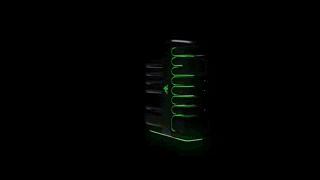The best idea to come out of CES so far is a desktop PC
A modular computer that looks like an Xbox on steroids? Yes, please.

A free daily email with the biggest news stories of the day – and the best features from TheWeek.com
You are now subscribed
Your newsletter sign-up was successful
If you cut through all the noise and goofy buzzwords coming out of CES, you'll occasionally come across a new technology that's actually promising and useful. And so far, the big winner of the Bright Future Award appears to be the hardware masterminds at Razer, who know a thing or two about powerful and splashy machinery.
Razer's glitzy gaming rigs have quietly been killing the competition for years. And this modular desktop PC — dubbed Project Christine — might just be its slickest idea yet. The basic premise is that custom PCs are great if you're a hobbyist or tinkerer. But building your own rig from the ground up requires serious dedication and some bold-faced bravery, especially if you're prone to cracking fragile circuit boards with your Lennie-strength. As Hayden Dingman at PC World writes:
The current model is basically: "Find the correct inputs and outputs for dozens of tiny components, snap them all together, and pray nothing breaks." [PC World]
Project Christine inverts the model by putting the guts front and center. Basically your motherboard, video card, SSDs, doo-dads, and whatnots are wrapped up in interchangeable little Xboxes, which can be easily swapped out of what Razer is calling "the backbone."
The Week
Escape your echo chamber. Get the facts behind the news, plus analysis from multiple perspectives.

Sign up for The Week's Free Newsletters
From our morning news briefing to a weekly Good News Newsletter, get the best of The Week delivered directly to your inbox.
From our morning news briefing to a weekly Good News Newsletter, get the best of The Week delivered directly to your inbox.

Each module then automatically syncs so you don't have to fuss with uninstalling and installing drivers. No mess. No cords. And no begging the help desk guy at Fry's for store credit after your overclocking experiment goes haywire.
In theory, you could buy new parts whenever something breaks, or when you simply need an upgrade. Which isn't to say the concept — and yeah, it's still just a concept — isn't without hurdles, as Gizmodo's Eric Limer points out:
Razer isn't making Project Christine right now, just gauging interest. And if it gets made you can bet it will be mind bogglingly expensive. That's also not to mention the difficultly of getting graphics card makers and other folks to start producing special "Project Christine" modules based on the reference designs. There are a lot of potential complications. [Gizmodo]
That said, it's still a great idea that could breathe new life into a rapidly diminishing PC industry. Please make this happen, Razer.
A free daily email with the biggest news stories of the day – and the best features from TheWeek.com
-
 Crisis in Cuba: a ‘golden opportunity’ for Washington?
Crisis in Cuba: a ‘golden opportunity’ for Washington?Talking Point The Trump administration is applying the pressure, and with Latin America swinging to the right, Havana is becoming more ‘politically isolated’
-
 5 thoroughly redacted cartoons about Pam Bondi protecting predators
5 thoroughly redacted cartoons about Pam Bondi protecting predatorsCartoons Artists take on the real victim, types of protection, and more
-
 Palestine Action and the trouble with defining terrorism
Palestine Action and the trouble with defining terrorismIn the Spotlight The issues with proscribing the group ‘became apparent as soon as the police began putting it into practice’